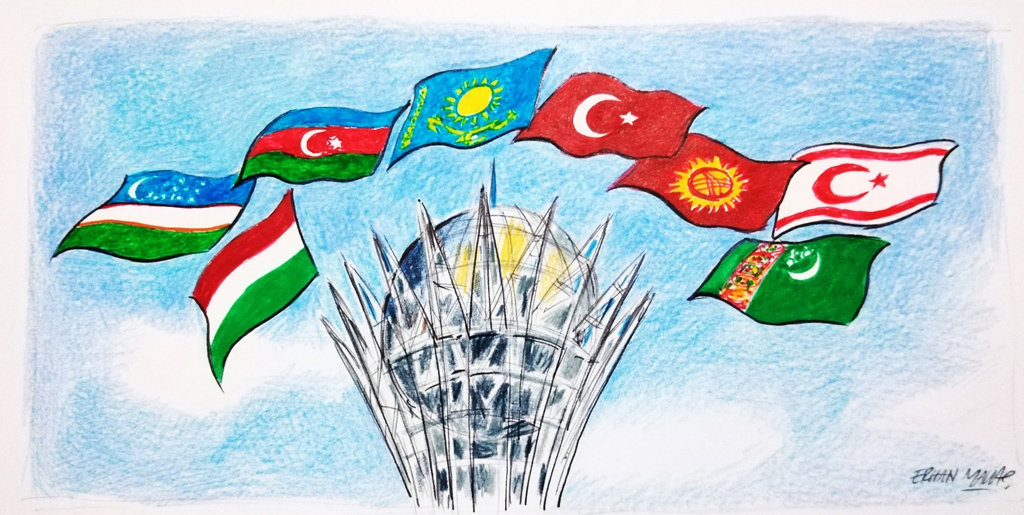I was in Astana, Kazakhstan earlier this week to attend the 10th Summit of the Organization of Turkic States (OTS), whose main theme was “Turk Time” (or “Turkic Age”). Addressing the five member states – Türkiye, Azerbaijan, Kazakhstan, Uzbekistan and Kyrgyzstan, and the three observers – Hungary, Turkmenistan and the Turkish Republic of Northern Cyprus, President Recep Tayyip Erdoğan stressed that the “unity and solidarity of the Turkic world” was the single greatest force in dealing with global challenges. Recalling that the delivery of Caucasian natural gas to Türkiye and Europe made a major contribution to “security,” he raised another important point: “We will work together to turn the period ahead into the ‘Turk Time’ by incorporating our ‘Century of Türkiye’ vision into the Organization of Turkic States.” Erdoğan also highlighted the importance of making it easier for the citizens of member states to cross borders and obtain visas. Last but not least, he talked about the massacre in Gaza, insisting that the Turkic world could facilitate a cease-fire and, later, peace by working together.
The pursuit of Turkic integration has been a cornerstone of Turkish foreign policy in recent years. That development was directly linked to the Central Asian republics “opening up” and seeking to perform a “balancing act” between the great powers. This also included Uzbekistan and Kazakhstan’s opening up to the world. At the same time, the ever-stronger strategic partnership between Türkiye and Azerbaijan changes the regional balance of power.
Let us recall that Türkiye could not work as closely with the Turkic world as it intended when the Soviet Union disintegrated in 1989. Under a series of weak coalition governments, the country’s ability to invest in the Turkic republics or provide security and stability to that region was extremely limited at the time. In contrast, Türkiye effectively helps the relevant countries hold their ground, to their own advantage, amid the great power competition in Central Asia. Azerbaijan’s victory in Karabakh, in particular, highlighted Ankara’s ability to promote stability, security and cooperation in the region. To ensure that Central Asia does not become a venue for destructive competition over the next decades, Türkiye needs to focus more on its “integration” policy.
Interests in region
France and other European Union countries, whose political influence over Africa weakened due to a series of military coups, have been taking an increasingly strong economic interest in Central Asian nations, starting with Kazakhstan. Despite having retreated from Afghanistan, the United States hasn’t set aside Central Asia as part of its containment policy toward China. At the same time, Russia continues to exert a strong influence over the countries in that region – a remnant of the Soviet period.
China represents yet another stakeholder with strategic ambitions in the Central Asian equilibrium. Monitoring closely the Tibet, Taiwan and Uyghur questions with an eye on its future, Beijing has been reportedly worried about Turkic integration. In turn, the possibility of Chinese demographic and economic domination remains a medium- and long-term risk for Russia and the Central Asian republics. The vision of integration between the Turkic republics and Türkiye, which have strong historical, cultural and ethnic bonds, requires leadership, planning and the institutionalization of shared interests. Opening the Zangezur corridor represents a new opportunity for transportation and Erdoğan’s experience and skill in leader-to-leader diplomacy remain the greatest advantage.
Closer cooperation
The summit’s final communique reiterated the members’ commitment to strengthening multilateral cooperation. By adopting the Astana Act, the OTS established its Civil Protection Mechanism. The document called for “closer cooperation in the field of defense industry and military collaboration” to promote stronger cooperation and coordination in security affairs. It also called for an “immediate cease-fire” as well as humanitarian assistance, a two-state solution and a guarantee mechanism in line with Türkiye’s views regarding the Israel-Palestine conflict.
To sum up, the Astana Summit represented a new step as part of the integration process, which promotes new collaborations and a common stance toward global policies for the Turkic world.



